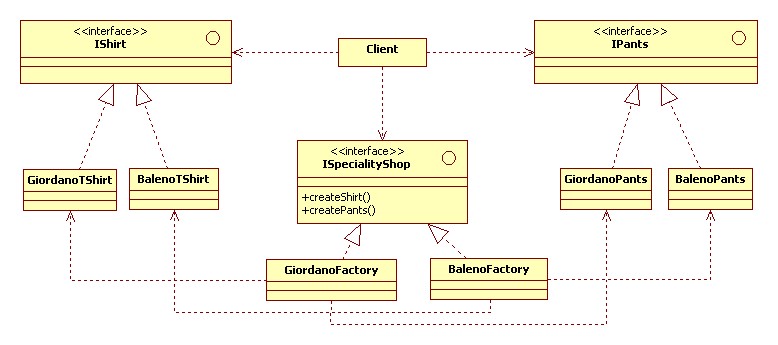我们平日走在步人街上都能看到很多专卖店,服装、珠宝等等;
拿服装专卖店来说,一个专卖店里面肯定有好几个品牌的服装,比如Giordano、Baleno,这些品牌都是不同公司生产的。
没人见个专卖店自己生产服装的吧,专卖店需要某个品牌的服装时,就去联系相应的厂家供货即可,具体的生产是由厂家去完成。
抽象工厂模式也是如此,抽象工厂提供多个抽象方法,由具体的子工厂去实现。
现在我想开一家服装店,经营上衣和短裤,至于具体什么品牌的等选门面在装修之时再定。
interface ISpecialityShop {
Shirt createShirt();
Pants createPants();
}
好了,现在门面选好且已装修完毕,具体经营什么品牌也早想好,就佐丹奴和班尼路吧。
开始联系厂家,厂家要能生产Shirt和Pants,而且要有生产Giordano、Baleno这两个品牌。
我们都知道服装都有一些共同的特征,每件衣服都有所属的品牌、每条短裤都有一个尺码。
interface Shirt {
// 品牌
String getBrand();
}
interface Pants {
// 尺寸
double getSize();
}
佐丹奴的衣服自然会印上Giordano字样的标志
class GiordanoTShirt implements Shirt {
public String getBrand() {
return "Giordano";
}
}
class GiordanoPants implements Pants {
public double getSize() {
return 31;
}
}
班尼路的也不例外,加上自己的品牌标志
class BalenoTShirt implements Shirt {
public String getBrand() {
return "Baleno";
}
}
class BalenoPants implements Pants {
public double getSize() {
return 29;
}
}
运气不错,很快就找到了厂家。
// 生产Giordano上衣和短裤的工厂
class GiordanoFactory implements ISpecialityShop {
Shirt createShirt() {
return new GiordanoTShirt();
}
Pants createPants() {
return new GiordanoPants();
}
}
// 生产Baleno上衣和短裤的工厂
class BalenoFactory implements ISpecialityShop {
Shirt createShirt() {
return new BalenoTShirt();
}
Pants createPants() {
return new BanlenoPants();
}
}
厂家开始供货,开业大吉,哈哈。
public class TestAbstractFactory extends TestCase {
public static void main(String[] args) {
TestRunner.run(TestAbstractFactory.class);
}
public void testFac() {
setShop(new GiordanoFactory());
IShirt shirt = shopFactory.createShirt();
shirt.getBrand();
IPants pants = shopFactory.createPants();
pants.getSize();
setShop(new BalenoFactory());
shirt = shopFactory.createShirt();
shirt.getBrand();
pants = shopFactory.createPants();
pants.getSize();
}
private void setShop(ISpecialityShop factory) {
shopFactory = factory;
}
protected void setUp() throws Exception {
}
protected void tearDown() throws Exception {
shopFactory = null;
}
private ISpecialityShop shopFactory;
}
以后想多经营几个品牌,只需直接去找了厂家供货即可。
最后,为了充分理解抽象工厂模式,画出它的UML图是很有必要的。
